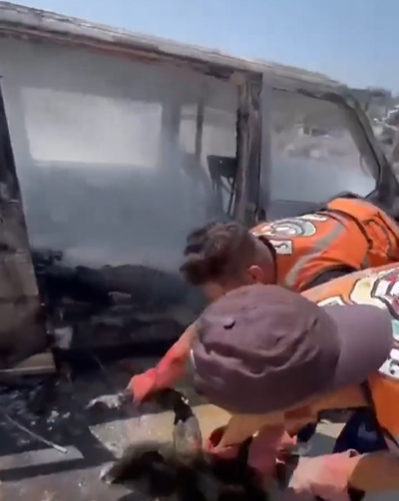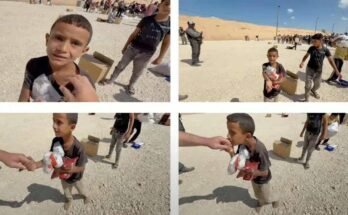A new Israeli airstrike in Gaza has once again highlighted the appalling human cost of the conflict for civilians. According to local reports, a car carrying a displaced Palestinian family was bombed and hit killing five people, including a child. The incident adds to an increasing toll of tragedies in which civilians have borne the brunt of military escalations disproportionately.
Gaza residents described how the family was attempting to leave an area of active fighting when their vehicle was struck without warning. The attack left the car a complete wreck, with locals rushing to the scene in an attempt to recover the bodies. The names of the deceased have not yet been released, but health officials said all five were civilians and included a young child.
The strike comes amid increased Israeli military activity documented in recent months. These operations in populated areas have drawn broad condemnation, particularly when targeting neighborhoods where families displaced from their homes have sought refuge.
This latest airstrike bears a haunting resemblance to past bombings, such as the airstrikes on Rafah on April 29, 2024, which killed a number of civilians. That bombardment, which was documented by ReliefWeb and other humanitarian agencies, was reported to have occurred without warning and struck residential districts and civilian gathering points. Aid agencies at that time branded it as a violation of international humanitarian law, noting that civilians were given no chance to depart or protect themselves.
International monitors have since noted repeated intensifications of Israeli operations across Gaza. Dozens of such attacks were documented between mid 2024 and 2025, many with civilian fatalities. Humanitarian agencies have argued that such attacks point to a systematic disregard for the principles of distinction and proportionality cornerstones of the laws of war.
The human cost of the ongoing escalation has been catastrophic. Gaza’s health sector, already seriously compromised by shortages of medicine and electricity, remains overwhelmed by the casualties. Hospitals operate above capacity, and thousands of displaced families are living in temporary shelters in very dire conditions.
The targeting of civilian residential areas has intensified displacement. It is estimated by UN agencies that hundreds of thousands of Palestinians have been displaced from their homes since late 2023, seeking shelter in schools, tent camps, or highly concentrated safe zones that are not secure from attack.
Children are paying the price. Human rights campaigners note that in addition to the direct fatalities, dozens of children are experiencing trauma, malnutrition, and very limited access to education. The fact that yet another child was killed in this week’s strike underscores the long-term intergenerational impact of the conflict.
International reaction to the strike has been swift. Human rights organizations, including Amnesty International and Human Rights Watch, resumed their demand for independent investigations into Israeli strikes that result in civilian deaths. They argue that indiscriminate or disproportionate attacks can amount to war crimes under the Geneva Conventions.
Several governments have also made statements. While some Western allies continue to defend Israel’s right to security, there has been growing criticism of what appears to be a failure to show restraint in the use of military force. Regional leaders particularly in the Arab world have condemned the killings and urged the world to intervene with stronger diplomatic pressure.
The strike comes amid heightened military action and political stalemate. Negotiations for a longterm truce between Israel and Palestinian factions have repeatedly collapsed with civilians caught in the middle
In April 2024, as Rafah was being bombed, the world briefly resumed demands for a humanitarian ceasefire but despite repeated United Nations pleas ceasefire agreements have been dispite fragile falling apart within days. The fighting has eroded faith in diplomacy and left civilians with little hope of respite
Meanwhile relief agencies stress that Gaza’s humanitarian situation has reached historic lows. Food for security has worsened, with some agencies forecasting famine-like situations if humanitarian access is not increased. Clean water and electricity remain in limited supply, and medical supplies are critically low.
The fatalities of five members of a single displaced family are not an isolated event but rather part of a broader pattern that raises questions of accountability and the ultimate destiny of Gaza’s civilian population. Short of grave humanitarian and political intervention, the analysts suggest, the crisis could spiral even further out of control.
The international community has a defining moment in front of it now: whether to issue more statements of concern or to take concrete actions that might prevent more civilian deaths. To the civilians of Gaza, however, the crisis is current and horrific families continue to be killed for no more than attempting to seek shelter.
As humanitarian monitors have repeatedly noted, the protection of civilians is not an option but an absolute requirement of international law. The bombing from the air of a family car in Gaza is a stark reminder of how far from that standard the conflict has fallen.
Israeli Airstrike on Displaced Family in Gaza Sparks Outrage Over Civilian Casualties



